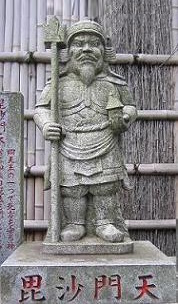Bishamonten is one of the deities (fukunokami) of the Seven Lucky Gods of Japan (Shichifukujin); the other six being:

Bishamonten is a Buddhist deity from India (Sanskrit: Vaiśravaṇa), a protector of the righteous and a symbol of authority. In Japan, one of his roles is a god of war, but in India he was considered a god of wealth, with hardly any military responsibilities.
Nevertheless, as one of the Four Heavenly Kings (shi-tenno), he was relied upon to protect Buddhist monks from dangerous spirits (yakshas) and for ensuring compliance with Buddhist law. Each King was responsible for one of the four directions, and Vaiśravaṇa protected the northern quarter in the city of Ālakamandā, a name synonymous with wealth.
It's worth noting that Vaiśravaṇa is a position; not a particular entity. Vaiśravaṇa is mortal and only lives for 9,000,000 years (or a much shorter 90,000 years, depending on which scriptures you read.) The Vaiśravaṇa mentioned on this page was called Kubera who lived in Sri Lanka and sometimes the name Kubera is used instead of Vaiśravaṇa.
Kubera owned a prosperous sugarcane field and had sufficient wealth to give alms to poor people. As a deity, he continues his philanthropy.
When his statue or painting is created as one of the Four Heavenly Kings, he's referred to as "Tamonten", and as "Bishamonten" when depicted alone.
Bishamonten is usually shown wearing a leather armour suit of the Tang dynasty style. In one hand he holds a sword, spear, trident or pike (hoko). In the other he holds a small 'treasure tower' or pagoda (tahoutou).
He dispenses treasure and good fortune to poor, worthy people. The treasure includes rich harvests, prosperous business, family security, and a long, successful life. Having dispensed the treasure, he then protects the awardees from evil and advises them how to use their treasure.